Study of the Management and Disposal Practices of Unused or Out-of-Date Medicines by Households in the Municipality of Ouagadougou, Burkina Faso
Study of the Management and Disposal Practices of Unused or Out-of-Date Medicines by Households in the Municipality of Ouagadougou, Burkina Faso作者机构:Drug Development Laboratory African Center of Excellence for Training Research and Expertise in Pharmaceutical Sciences (CEA-CFOREM) Sciences and Health Doctoral School Training and Research Unit in Health Sciences Joseph KI-ZERBO University Ouagadougou Burkina Faso Charles De Gaulle University Children's Hospital (CHUP-CDG) Ouagadougou Burkina Faso National Agency for Pharmaceutical Regulation (ANRP) Ministry of Health Ouagadougou Burkina Faso Public Health Laboratory Sciences and Health Doctoral School Joseph KI-ZERBO University Ouagadougou Burkina Faso
出 版 物:《Journal of Biosciences and Medicines》 (生物科学与医学(英文))
年 卷 期:2024年第12卷第3期
页 面:291-302页
主 题:Unused Medicines Expired Medicines Disposal Household Risk
摘 要:Introduction: Not all medicines that pass-through consumers’ hands are used, and some often expire in households. These health products can be sources of accidental risks and pollution when they are not properly disposed of. In Burkina Faso, there are as yet no guidelines for the disposal of unused medicines in households. The aim of this study was to estimate the extent of household possession of unused or expired medicines, and to describe attitudes and disposal practices. Methods: This was a descriptive cross-sectional study covering households in the Ouagadougou commune conducted from June to August 2021. Two-stage stratified sampling was used: selection of Enumeration Zones (EZs) and selection of households, with each EZ comprising several households. Data collection was based on direct interviews using a structured questionnaire. Data were processed using Epi Info software version 7.***.4.0. Results: In total, 417 household residents were surveyed out of the planned 423 households, corresponding to a completion rate of 98.58% compared with the initial sample. Among the respondents, 79.62% had unused and/or expired medicines in their household. A total of 2562 drug packaging units were counted, for a total weight of 121.90 kg. Nearly 75% were aware that improper disposal was a danger to the environment. Some respondents kept their unused medicines at home until they expired (43.41%), and disposed of them mainly by throwing them in the household garbage (75.58%). The majority (79%) were in favor of the government setting up a take-back program for these medicines. Conclusion: The introduction of a take-back program for unused or out-of-date medicines will ensure safer disposal of medicines, and better protection for households and the environment.



